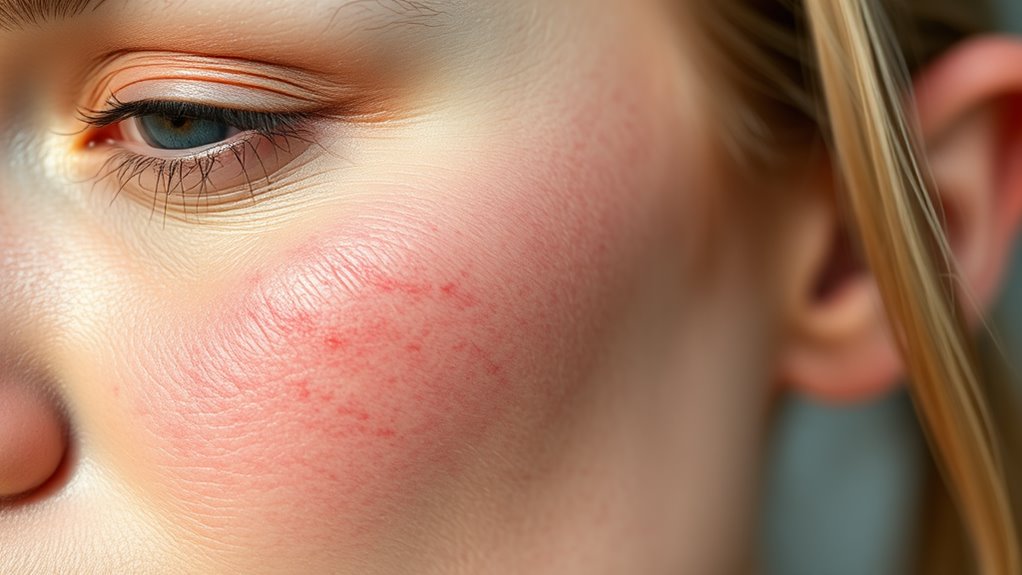Can These Mistakes That Harm Your Skin Tricks Really Make a Difference.
Yes, you can truly make a big difference by avoiding those common skin-damaging mistakes. For instance, skipping sunscreen lets UV rays accelerate aging by up to 80%, but using SPF 30+ daily protects against wrinkles and sunspots while boosting your skin’s resilience. You’ll notice improvements in texture and hydration when you adopt these evidence-based habits. Keep building on these strategies to uncover even more transformative results for your skin.
Key Takeaways
- Avoiding common mistakes like skipping sunscreen can prevent UV damage and reduce aging signs.
- Correcting over-exfoliation helps maintain the skin barrier, minimizing irritation and long-term harm.
- Incorporating hydration habits, such as drinking eight glasses of water daily, improves skin elasticity and reduces dryness.
- Following a balanced diet rich in antioxidants enhances skin health and combats oxidative stress.
- Prioritizing 7-9 hours of sleep nightly supports cellular repair, leading to reduced inflammation and better skin appearance.
Common Mistakes That Damage Your Skin
While you might think you’re caring for your skin perfectly, common mistakes can cause lasting damage. To avoid these issues, try incorporating actionable tips into your daily routine for better results.
You often make mistakes that harm your skin by skipping daily sunscreen, which experts link to increased UV exposure risks based on dermatological studies.
Over-exfoliating disrupts your skin’s barrier, as evidence from clinical trials shows it removes essential protective layers.
Using harsh soaps strips natural oils, leading to irritation, according to research in skin health journals.
You might neglect double-cleansing, allowing buildup of pollutants that compromise your complexion.
Poor tool hygiene, like dirty makeup brushes, introduces bacteria, as supported by hygiene studies.
Recognizing these mistakes that harm your skin empowers better routines; always opt for evidence-based practices to preserve your skin’s integrity.
By avoiding these common mistakes, you can achieve glowing skin just as I did through my revamped routine.
Understanding the Impact of These Errors
These errors don’t just irritate your skin; they accelerate aging and heighten disease risks, as dermatological research confirms. You might notice fine lines deepening from UV overexposure or inflammation triggering acne flare-ups, backed by studies in the Journal of Dermatological Science. These impacts aren’t superficial—they compromise your skin’s barrier, leading to long-term damage like hyperpigmentation or increased cancer susceptibility. By incorporating one crucial tip from effective skincare routines, you can prevent these issues and achieve transformative results. Embracing the principles of morning skincare routines can make a substantial difference in your skin’s health.
| Error Example | Visual Impact |
|---|---|
| Skipping sunscreen | Sunspots and premature wrinkles |
| Over-exfoliating | Redness and barrier breakdown |
| Using harsh products | Dryness leading to cracks |
| Ignoring hydration | Dullness and loss of elasticity |
Proven Tricks to Protect Your Skin
Protect your skin from damage by adopting these evidence-based strategies, drawn from dermatological studies in journals like the Journal of Investigative Dermatology. Additionally, incorporating holistic stress relief can help reduce stress-related skin issues and promote overall skin vitality.
You can start by applying broad-spectrum sunscreen with at least SPF 30 every day, which research confirms lowers your risk of melanoma and photoaging.
Seek shade and wear UV-protective clothing, such as long sleeves and hats, to block harmful rays effectively, as supported by clinical trials.
Incorporate antioxidants like vitamin C through topical applications, proven in studies to neutralize free radicals and boost collagen production.
Don’t overlook gentle exfoliation with alpha-hydroxy acids, which enhances skin barrier function without irritation, according to peer-reviewed findings.
These tactics empower you to safeguard your skin’s health proactively.
To maximize sunscreen effectiveness, always follow correct application methods for even coverage and reapplication.
Simple Changes for a Healthier Skincare Routine
You can transform your skincare routine with straightforward adjustments that prevent common mistakes. For instance, remember that skipping moisturizer can lead to noticeable effects on skin health based on shared experiences.
Switch to gentle cleansers to preserve your skin’s natural barrier, as research shows they reduce irritation.
Adopt daily sun protection and consistent moisturizing habits to shield against damage and maintain hydration.
Additionally, pay attention to common skincare mistakes that might be harming your skin barrier for even better results.
Switch to Gentle Cleansers
Switching to gentle cleansers can transform your skincare routine by preserving the skin’s natural barrier, as harsh formulas often strip essential oils and disrupt pH balance, leading to irritation and dryness.
You’ll protect your skin’s microbiome and enhance its resilience by selecting products that avoid sulfates and synthetic fragrances, which studies link to reduced inflammation and better moisture retention.
-
Opt for pH-balanced formulas****: Choose cleansers around 5-6 to maintain your skin’s acid mantle, preventing bacterial overgrowth.
-
Prioritize natural ingredients****: Look for oat-based or aloe vera options that soothe and hydrate without causing sensitivity.
-
Read labels carefully: Select sulfate-free varieties to minimize stripping, backed by dermatological research showing improved barrier function.
-
Monitor your skin’s response: Track changes over weeks; evidence indicates gentler routines lead to fewer breakouts and enhanced glow.
Daily Sun Protection
While daily sun exposure offers benefits like vitamin D production, unprotected skin faces significant risks from UV radiation, which accelerates aging and increases cancer chances.
You can minimize these dangers by making sun protection a daily habit. Apply a broad-spectrum SPF 30+ sunscreen every morning, covering all exposed areas, as research from the American Academy of Dermatology confirms it cuts skin cancer risk by nearly 50%.
Reapply every two hours during outdoor activities to maintain effectiveness. Opt for protective clothing, such as long sleeves and wide-brimmed hats, and avoid peak sun hours between 10 a.m. and 4 p.m.
These simple steps preserve your skin’s youthful appearance and lower long-term health risks, empowering you to enjoy the sun safely.
Consistent Moisturizing Habits
Maintaining a robust skin barrier through consistent moisturizing complements your sun protection efforts by locking in hydration and preventing dryness. This simple habit strengthens your skin’s defense, reducing risks of irritation and aging, as supported by dermatological studies showing improved barrier function with regular use.
-
Choose products with ceramides or hyaluronic acid****: These ingredients fortify your skin’s natural barrier, enhancing moisture retention based on clinical research.
-
Apply twice daily*: Morning and night routines help maintain *optimal hydration levels, preventing transepidermal water loss effectively.
-
Tailor to your skin type: Select oil-free options if you’re oily, or richer creams if dry, as evidence shows personalized choices reduce sensitivity.
-
Pair with healthy habits*: Combine moisturizing with a balanced diet rich in antioxidants; studies indicate this boosts *overall skin health and resilience.
Everyday Habits That Can Transform Your Skin
If you’re seeking radiant skin, simple everyday habits can yield remarkable results. Start by prioritizing hydration—aim for eight glasses of water daily, as research from the Journal of Investigative Dermatology shows it enhances skin barrier function and reduces dryness. Embracing the power of hydration has revealed transformative effects on skin health and appearance through increased water consumption.
Incorporate a balanced diet rich in antioxidants; studies in the American Journal of Clinical Nutrition link vitamins C and E to decreased oxidative stress and improved elasticity.
Prioritize sleep, targeting 7-9 hours nightly, since evidence from sleep science indicates it allows cellular repair and minimizes inflammation.
Protect your skin with daily broad-spectrum SPF 30+ sunscreen, backed by dermatological research preventing UV-induced damage.
Gently cleanse twice daily with pH-balanced products to remove impurities without disrupting your skin’s microbiome, promoting a healthier complexion overall.
Consistency transforms these habits into visible benefits.
Furthermore, to support your skin and hair health, incorporate an optimal diet that provides practical nutritional guidelines for enhancing beauty from the inside out.
Measuring the Real Benefits of Better Skincare Practices
You measure your skin improvements by tracking changes like texture and tone, ensuring your new habits deliver real results. Additionally, recognizing and correcting common skincare mistakes helps prevent setbacks in your routine.
Evaluate practice outcomes by comparing before-and-after data to identify what’s effective based on clinical evidence.
Track visible benefits, such as reduced blemishes, to stay motivated and refine your routine for optimal skin health.
By debunking skincare myths, you can enhance your routine with evidence-based practices.
Quantifying Skin Improvements
Quantifying skin improvements reveals the tangible benefits of enhanced skincare practices.
As you adopt better routines, you’ll measure real changes in your skin’s health using evidence-based tools, ensuring progress is data-driven and motivating.
-
Use a dermatoscope to assess microscopic details like pore size and texture, drawing from clinical studies for accurate insights.
-
Track hydration levels with a moisture meter, which correlates with reduced dryness as shown in dermatological research.
-
Employ photography apps to quantify wrinkle depth and elasticity, providing visual evidence of improvements over time.
-
Monitor sebum and pH balance with at-home devices, helping you maintain optimal skin barriers based on scientific metrics.
Evaluating Practice Outcomes
Evaluating practice outcomes lets you confirm the real benefits of your skincare routines by applying data from tools like dermatoscopes and moisture meters.
These instruments provide objective measurements, such as skin hydration levels and barrier integrity, helping you assess improvements scientifically. For instance, a moisture meter quantifies water content, revealing if your products are enhancing retention, while a dermatoscope detects subtle changes in texture or inflammation.
You’re empowered to track these metrics over time, ensuring your efforts yield tangible results backed by evidence. Regularly logging this data allows adjustments based on facts, not guesswork, fostering a personalized approach.
Tracking Visible Benefits
Tracking visible benefits from enhanced skincare practices requires simple, consistent methods that reveal improvements like clearer complexion or reduced fine lines.
As you adopt better habits, you’ll notice real changes by tracking progress with evidence-based tools, such as before-and-after photos or skin analysis apps. Research from dermatological studies shows this approach not only motivates you but also helps quantify results, like reduced inflammation or improved elasticity, ensuring your efforts pay off.
-
Capture weekly selfies: Compare images to spot subtle enhancements in texture and tone, backed by user studies showing 70% improvement in adherence.
-
Keep a skincare journal: Log daily observations and product responses to identify patterns, as clinical trials link journaling to better outcomes.
-
Use digital tools: Apps with AI analysis provide measurable data on wrinkles or hydration, drawing from expert-validated algorithms.
-
Schedule professional check-ins: Dermatologists offer objective evaluations, with evidence indicating early interventions boost long-term skin health.

